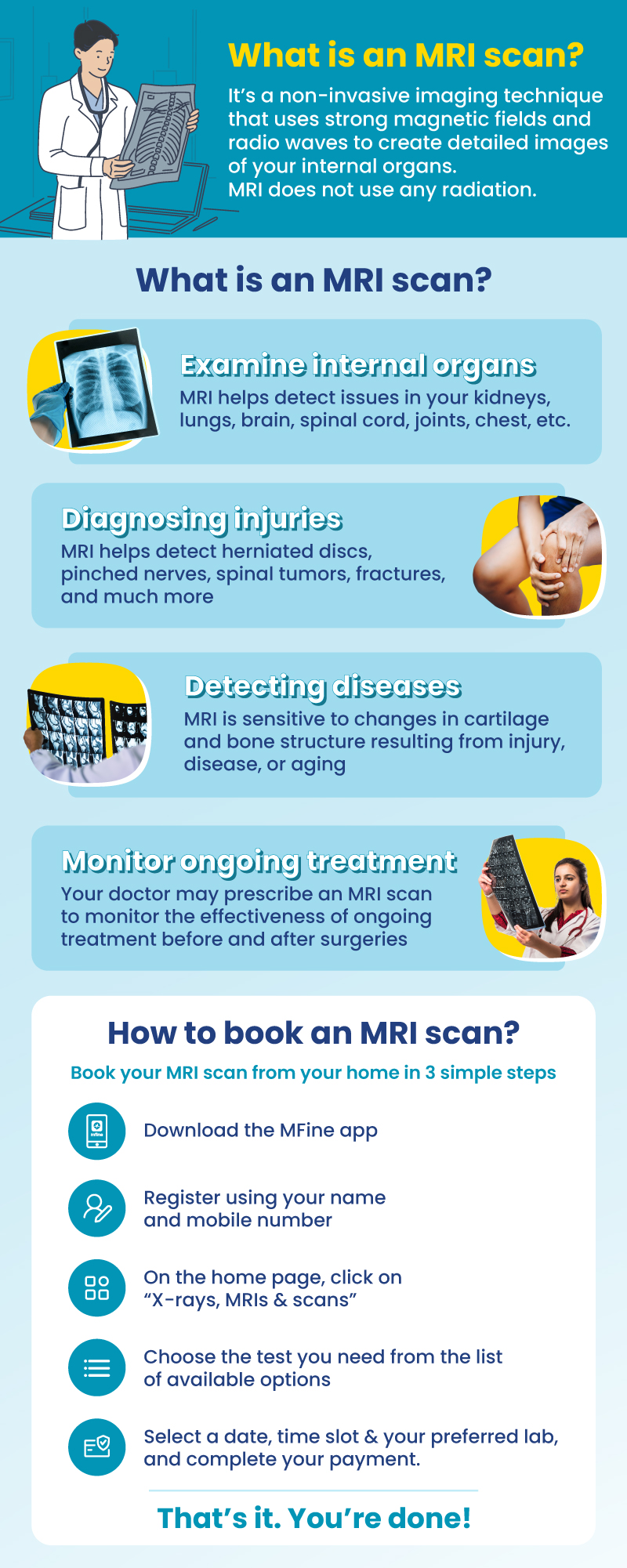
Lowest MRI scan cost in Bangalore!
MRI Scan, or Magnetic Resonance Imaging, is a special type of scan that uses magnets and radio waves to create a detailed image of a body part on a computer.
MFine offers high-quality lab options and an excellent discount of up to 50% on your MRI Scan in Bangalore.
MRI Scan In Bangalore By MFine
|
Generally, the market price of an MRI Scan in Bangalore is ₹ 7500, but with us, you can get it for ₹ 3415 only.
Avail of this exclusive offer by calling us at
Or you can click on the button below for us to call you back.
You can book an online doctor consultation after booking the test.
The following is a list of the most common MRI scans in Bangalore and their offer prices. Note that the prices mentioned below may vary. Call us to know the updated prices.
MRI Scan Cost In Bangalore |
Offer Price |
| MRI Brain Price in Bangalore | ₹3415 |
| MRI Spine Price in Bangalore | ₹3415 |
| MRI Knee Price in Bangalore | ₹3415 |
| MRI Chest Price in Bangalore | ₹3415 |
| MRI Ankle Price in Bangalore | ₹3415 |
| MRI Elbow Price in Bangalore | ₹3415 |
| MRI Shoulder Price in Bangalore | ₹3415 |
| MRI Whole Abdomen Price in Bangalore | ₹3415 |
| MRI Neck Price in Bangalore | ₹3415 |
| MRI Brain Contrast Price in Bangalore | ₹3415 |
| MRI Chest Contrast Price in Bangalore | ₹3415 |
| MRI Spine Contrast Price in Bangalore | ₹3415 |
Call us on 08061970525 to know the lab options near your place in Bangalore and make a booking at your convenient time.
Why Should I Book an MRI Through MFine?
|
Exclusive Benefits with MFine
(1) Certified labs
Get access to over 600+ labs certified by NABL and NABH
(2) Same-day slot available
Get scans done on the same day
(3) Quick and convenient
Get reports in 12 hours and digital films in 15 – 20 minutes
(4) FREE Consultation
Post scans, consult a doctor for free to review your report
About MRI Scan:
What is an MRI?
Magnetic Resonance Imaging is abbreviated as MRI. It is an advanced non-invasive imaging technique used to detect and diagnose various abnormalities in your body.
An MRI scan is performed using strong electromagnetic waves to assess images of your body’s internal organs. It is capable of detecting abnormalities in internal organs such as the kidneys, liver, brain, spinal cord, joints, chest, lungs, etc.
An MRI procedure usually does not require any special preparation. However, sometimes a contrast material will be used to get a clear picture of the abnormality. In that case, you should fast for at least 12 hours before the procedure. The contrast dye will be given orally or injected into the vein.

You should remove all objects with metallic contents before entering the MRI scan room. You may also be asked to change into a gown provided by the lab.
The MRI machine has a sliding table on which you need to lie down to be sent in for the imaging process. Once you are inside, the magnets in the machine will start rotating around the body part being diagnosed. This will create a strong electromagnetic field, and these signals will be picked up and sent to a special computer to process into an image.
A radiologist will observe the entire test procedure from a nearby chamber with the help of a microphone and speakers. Usually, it takes up to 90 minutes to complete the entire procedure, depending on your study.
An MRI scan is generally safer compared to other imaging techniques that use radiation. However, the MRI scan has its limitations. Individuals who have undergone heart surgery for a heart valve implant or have implanted any kind of metallic clips or plates are not permitted to undergo an MRI scan.
Types of MRI scans
There are several types of MRI scans commonly used in medical practice. Here are some of the most common types:
(1) Functional Magnetic Resonance Imaging (fMRI):
fMRI measures brain activity by detecting changes in blood oxygenation, helping researchers and doctors understand brain functions during specific tasks or in various neurological conditions. This type of scan is used in diagnosing epilepsy and brain tumors, and also they’re used in radiation therapy, post-treatment scans, etc.
(2) Cardiac Magnetic Resonance Imaging
This specialized MRI focuses on the heart, producing detailed images of its structure and function, aiding in the diagnosis of heart conditions such as myocardial infarction, heart defects, and cardiomyopathies.
(3) Breast MRI
Breast MRI is used to examine breast tissue, particularly in cases of breast cancer evaluation, determining the extent of tumors, and screening high-risk patients.
(4) Magnetic Resonance Imaging of the Brain
This standard MRI scan provides detailed images of the brain’s anatomy, helping in diagnosing neurological disorders, tumors, strokes, and other brain abnormalities.
(5) Extremity MRI
An extremity MRI is used to visualize joints, muscles, ligaments, and bones in the arms and legs, aiding in diagnosing injuries, arthritis, and other orthopedic conditions.
(6) Abdomen MRI
This MRI scan focuses on the abdominal region, providing detailed images of organs like the liver, kidneys, pancreas, and spleen, aiding in diagnosing tumors, inflammation, and other abdominal issues.
Prerequisites for MRI Scan:
The following are the prerequisites for an MRI scan if contrast dye is used in the procedure:
- A minimum of 12 hours of fasting is required before the scan.
- Bring Creatinine and Blood Urea reports to the scan center.
- Take previous medical reports to the lab if there has been any former consulting.
Frequently Asked Questions
Is an MRI scan painful?
No, an MRI scan itself is not painful. However, some people may experience discomfort due to the confined space inside the MRI machine or the noise generated during the scan. Inform the technologist if you have any concerns, as they can provide earplugs or headphones to minimize discomfort.
Are there any risks associated with an MRI scan?
Generally, MRI scans are considered safe and do not involve exposure to radiation. However, certain individuals with metallic implants, such as pacemakers or metal clips, may not be suitable for an MRI scan. It is important to inform your healthcare provider about any metallic objects or medical devices you have before undergoing the scan.
Read more about MRI scan side effects: Is MRI safe for everyone?
Can I have an MRI scan if I am claustrophobic?
You can discuss your concerns with your healthcare provider if you are claustrophobic or anxious about enclosed spaces. They may be able to offer strategies to help you feel more comfortable during the scan, such as providing sedation or using an open MRI machine, which is less confining than a traditional closed MRI machine.
Will I be exposed to radiation during an MRI scan?
No, an MRI scan does not involve the use of radiation. It uses strong magnetic fields and radio waves to create detailed images of the body. Unlike X-rays or CT scans, which use ionizing radiation, MRI scans are considered safe in terms of radiation exposure.
Can I have an MRI scan if I have a tattoo or body piercing?
Having a tattoo or body piercing should not generally prevent you from undergoing an MRI scan. However, inform the technologist about any tattoos or body piercings you may have.
Can I undergo an MRI scan if I’m pregnant?
MRI scans are generally considered safe during pregnancy, especially when necessary for medical purposes. However, it is important to inform your healthcare provider if you are pregnant or suspect you might be, as they will assess the risks and benefits and determine the appropriateness of the scan. In some cases, alternative imaging methods may be considered to avoid any potential risks to the developing fetus.
What’s the difference between an MRI and a CT scan?
MRI uses strong magnets and radio waves to create detailed images of soft tissues, while CT scan uses X-rays to produce cross-sectional images of the body. MRI is better for visualizing soft tissues, while CT is more suitable for bone and lung imaging.
Is it safe to have 2 MRI scans in one day?
Having 2 MRI scans in one day is generally safe. However, it depends on the specific circumstances and the contrast agent used. Always consult with a healthcare professional to assess individual risks and benefits.
What are the disadvantages of MRI?
MRI can be expensive, time-consuming, and may cause discomfort for individuals with claustrophobia. Additionally, certain metal implants and devices can be unsafe in an MRI environment.
Why is an injection given before MRI?
An injection of a contrast agent is given before an MRI to enhance the visibility of certain tissues and blood vessels. It helps in detecting and characterizing abnormalities, such as tumors and vascular conditions, more effectively.
Can MRIs affect kidneys?
MRIs themselves do not directly affect kidneys. However, the contrast dye used in some MRI scans (gadolinium-based contrast agents) can pose a risk to individuals with kidney problems. It is essential to inform your healthcare provider about any kidney issues before undergoing an MRI with contrast.
Can I refuse contrast dye for MRI?
Yes, you can refuse contrast dye for an MRI. If your doctor recommends using contrast but you have concerns or contraindications, discuss alternative options with them to ensure a safe and suitable imaging approach.
Do doctors prefer MRI or CT scan?
The preference for MRI or CT scan depends on the specific clinical question and the area of the body being examined. Both imaging techniques have their advantages and limitations. Doctors will choose the most appropriate imaging modality based on the individual’s condition and the information required for diagnosis or treatment.
Other topics you may be interested in:

 Call us:
Call us:


 Call
Now
Call
Now